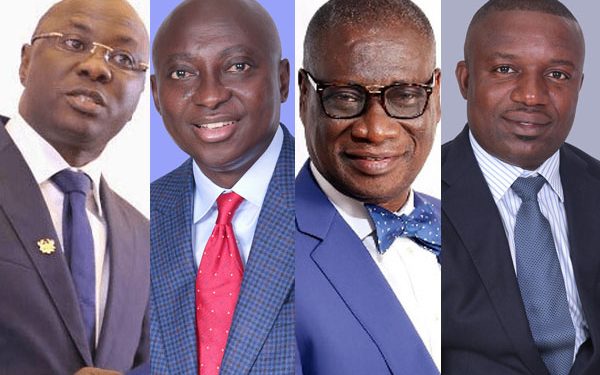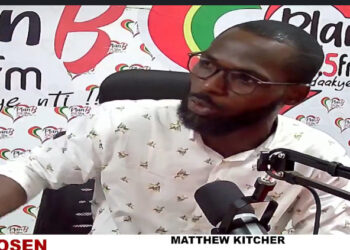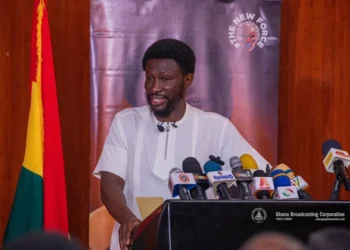The US$2 billion unconscionable gas deal between a Ghanaian-owned company; Genser and the state-owned Ghana National Petroleum Company (GNPC) and Ministry of Energy, is about to take a new twist akin to GNPC-AKER transaction with Minority National Democratic Congress (NDC) and the Majority New Patriotic Party (NPP) parliamentarians taking entrenched position and even contradicting each other.
Bright Simons of IMANI-Africa and Benjamin Boakye of African Centre for Energy Policy, have described the transaction as “a sweetheart deal” which has GNPC buying gas at US$7.9/ mmbtu and selling to Genser owned by a top financier of the governing NPP at US$2.79/ mmbtu.
Yesterday, the two sides met officials of GNPC on the platform of the Mines and Energy Committee of Parliament chaired by Samuel Atta Akyea, but members emerged out of the meeting with conflicting positions on the transaction on the responses from GNPC which has its Chief Executive, Opoku Ahweneeh Danquah, a relative of President Nana Akufo-Addo.
Samuel Atta Akyea, is a member of the Akufo-Addo family, who is mentioned to be profiting from the Genser deal through a company called West Coast Ghana Gas Limited.
Under Dr, KK Sarpong, West Coast Ghana Gas Limited was said to be making a whopping US$5 million annually, which has ballooned to US$12 million, since Opoku Ahweneeh Danquah, a grandchild of JB Danquah took over from Dr Sarpong.
But the fundamental question that IMANI and ACEP, have been asking is why GNPC is discounting the gas it purchases at an average rate of $6.08/MMBtu to Genser at $2.79/MMBtu, was not answered.
This question is even more relevant given that another state agency, Ghana Gas, sold gas to Genser at $6.5/MMBtu, until the Economic Management Team (EMT) directive in 2020 to stop Ghana Gas from selling gas to power companies.
While, the Majority side on the Committee’s chaired by Samuel Atta Akyea, who represents the Abuakwa South Constituency and Deputy Energy Minister Mohammed Amin Adam of the Karaga Constituency in the Northern Regions, said they were satisfied with the explanation of the GNPC, John Abdulai Jinapor, the NDC MP for Yapei Kusawgu Constituency, in the Savanna Region, was not satisfied, adding more information is required.
Dr Amin, on his part, proceeded to conclude that GNPC, has done no wrong. This is not surprising, given that Dr Amin and his former boss John Peter Amewu, are neck deep in the transaction, and some of the communications of GNPC, were addressed to him directly as Deputy Minister and Mr Amewu citing an EMT directive.
The Herald’s sources on the EMT led by Vice-President, Dr Mahamudu Bawumia, insist the EMT has not given any directive for gas to be sold to Genser or any other company below US$7.9/ mmbtu.
This paper learnt that sometime in April 2, 2019, the Energy Ministry and the Committee on Review of Gas Market Pricing made a presentation to EMT and proposed a gas price of US$5.61mmbtu, to reflect a reduction of US$1.68mmbtu on the Public Utility Regulatory Commissions (PURC) 2018 gas price of US$7.29mmbtu to Independent Power Producers (IPPs) in order to mitigate the effect of gas prices on electricity tariffs.
But at the said meeting, no company by Genser was mentioned and no decision was issued. It has been revealed that the meeting and presentation was purely an update presentation to EMT on how far the Ministry and Committee were exploring ways to reduce electricity tariffs by means of reducing the cost of gas prices.
Mr Jinapor, believes there are outstanding questions for the Corporation to answer. This creates doubt in the minds of the average person with an interest in the role of parliament as to who is telling the truth.
Already, the Herald can confirm that some of the Minority members of the committee are part of the lobby group to stop CSOs and independent-minded persons from critiquing the GNPC contract with Genser.
In a media interaction after the meeting with the GNPC, Mr Jinapor said “We just had a very long session with GNPC, a lot of questions, interrogations. Some have been answered, some are pending and we have asked for some information that they – GNPC – couldn’t provide at the meeting. We have directed GNPC to make them available to us. The financial analysis underpinning the agreement. The Analysis in terms of investment decisions.
He went on, “We are also aware that Ghana Gas is also deeply involved. So we have decided that we ought to summon Ghana Gas to also appear before us. I am clear in my mind that there are institutional overlaps. There are clear some turf war issues that ought to be addressed with and so clearly the committee will interrogate this matter to its logical conclusion.
According to Mr Jinapor, who appears to be the only voice on this Genser deal from the Minority side “Our duty is to ensure we will get to the bottom of it. Our duty is to ensure that the state is not shortchanged, and I can assure you that we will do everything within our capacity to get to the bottom of this matter and to ensure that the ordinary taxpayer is safeguarded and so it is too early for the minister to draw such conclusions.
“We have serious issues especially with capacity charges with payments that we are making when we are not consuming all the pipeline charges. We are well aware that Genser wanted to construct a 12-inch pipeline that Ghana Gas decided that they should rather constrict a 20-in pipeline. Why will Ghana Gas do that? Where are the underlying volumes? We are going to interrogate all that and, so it is work in progress and will are going to deal with this matter.
The Deputy Minister who was in the meeting with GNPC had said “the agreement between GNPC and Genser which is the subject of the public interest, I think that it is important we understand it. Some of the headlines you read are not factual and they do not help. When you have done analysis. So-called independent analysis you need to put against the fact, and the only way to do that is speak to the institutions involved otherwise people will form their opinions on misleading statements.
This is why I am very happy that Parliament has shown interest in this. Our Parliament is a very responsive Parliament and the committee of Parliament; the Mines and Energy Committee has met with GNPC and the Ministry of Energy and we provide all the answers they want for the questions relating to the allegations that have been made by IMANI ACEP and we know that they are going to scrutinize this agreements and the questions we have answered the answers are going to be put to test and in due course, the nation will be informed as to whether what we did is in the interest of our country. Such headlines can be misleading. When you say that Ghana is losing 1.5 billion and the analysis does support that, you are misleading the public. So it is important that you talk to the agency. They will open the books to you. GNPC is ready to open the books to whoever has concerns about that agreement. The fact that they are here to explain to Parliament means that they are not afraid to open the books. Parliament is a representative of the people so if we can open the books to Parliament, why not the public.
Atta-Akyea on his part, said work was still in progress and mentioned it is currently premature to come to a conclusion. The only thing which is a sore point for me, is that, I was thinking that before IMANI and ACEP will put out into the public domain matters of these consequence, they should have made those matter referable to GNPC. This is what we found, what are you comments and they would incorporate their side of the story into the report. They didn’t do that. So for me it is so adversarial for comfort. We just going to bring Ghana Gas into the picture. We slated them for Monday. After we done a good and balancing act, I could speak to the issues but for now, it is a bit exaggerated.
The mines and energy committee of parliament took an interest in the recent expose of a grand conspiracy by officialdom at GNPC and the Ministry of Energy to cause financial loss to the state. The Herald and some CSOs have confirmed that GNPC sells gas to Genser, a private company, at $2.79/MMBtu instead of the regulatory market price of $6.08/MMBtu. The Corporation has also amended its contract with Genser further to discount the gas price to $1.72/MMBtu.
Therefore, if parliament sought to genuinely intervene and protect the state’s interest, the question of why such a massive discount on the commodity should have been the priority of the Committee. Rather, mixed commentary from members of the Committee only shows that parliament is just interested in clearing GNPC from accountability.
In the substantive presentation made by GNPC to the Committee, it is intriguing that GNPC presented different numbers from what is in the contract. Speaking to JoyNew, the Executive Director of ACEP, Benjamin Boakye, sounded surprised why Parliament allowed GNPC to present blatant untruths that are not in the contract in a bid to justify the obnoxious concessions granted to Genser. According to him, the GNPC provided a discount on the gas price approved by PURC, as explained in the definitions of the Contract.
The Herald can also confirm that page eight of the contract state *GEGL Pipelines Gas Discount Charge” means (a) prior to PPOZ Commissioning Date, US$3.29/MMBtu; and (b) from and including thePP02 Commissioning Date, US$4.36/MMBtu;
However, GNPC convinced the parliament committee that they did not provide a discount on the gas. The conundrum remains whether Parliament is committed to saving Ghana money in this current economic difficulty that the country finds itself. At this point, it appears to be an exaggerated hope for parliament to pierce the veil of the contract.










Discussion about this post